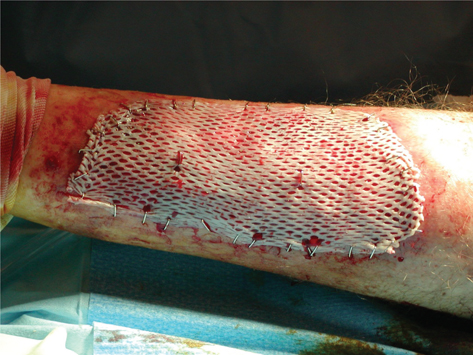Skin Grafting in Georgia
Search and Compare the Best Clinics and Doctors at the Lowest Prices for Skin Grafting in Georgia

Find the best clinics for Skin Grafting in Georgia
No clinics available
Israel offers the best prices Worldwide
Price: $ 6,002

- Home
- Georgia
WHY US?
At Medijump, we're making medical easy. You can search, compare, discuss, and book your medical all in one place. We open the door to the best medical providers worldwide, saving you time and energy along the way, and it's all for FREE, no hidden fees, and no price markups guaranteed. So what are you waiting for?

Free

Best Price

Widest Selection

Risk-Free
What you need to know about Skin Grafting in Georgia

Skin grafting is a type of surgery that involves removing skin from an area of the body and transplanting it to a different area. The transplanted skin tissue is called a skin graft. This surgery may be done to treat burns, extensive wounding or trauma, and areas of extensive skin loss caused by infection, such as purpura fulminans and necrotizing fasciitis. Skin grafting may also be used in certain surgeries that may need skin grafts for healing to occur, such as the removal of skin cancer.
There are two basic types of skin grafts:
- Split-thickness grafts involve removing the top layer of the skin (the epidermis) and a portion of the deeper layer of the skin (dermis). The skin is taken from a healthy part of the body (donor site). The grafts are used to cover large areas.
- Full-thickness grafts involve removing all of the epidermis and dermis from the donor site. This type of graft is usually used for small wounds that are located on highly visible parts of the body, such as the face.
What does a Skin Grafting Procedure Involve?
Skin grafting is performed under a general anaesthetic, which means you will be asleep and will not feel any pain during the procedure. In some cases, local anaesthetic may be used instead.
Your surgeon begins the surgery by removing skin from the donor site. For split-thickness grafts, the skin will be removed from an area of the body that is usually hidden by clothing, such as the outside of your thigh or the hip. For full-thickness graft, the skin is taken from the abdomen, forearm, groin, or an area above the collarbone.
After your surgeon removes the skin from the donor site, it will be placed carefully over the transplant area and secured with surgical dressing, stitches, or staples. If the transplant area is especially large, the skin from the donor site may be meshed in order to stretch it into a larger patch.
How Long Should I Stay in Georgia for a Skin Grafting Procedure?
For a split-thickness graft, you may need to stay in the hospital for a few days to ensure that the graft and the donor site are healing correctly. A full-thickness graft may require one to a two-week hospital stay. After you are discharged from the hospital, plan to stay in Georgia for at least 10 to 14 for more days for scheduled follow-up checkups where your doctor changes your dressing.
What's the Recovery Time for Skin Grafting Procedures in Georgia?
The donor site generally takes anywhere from several days to a week to heal. You need to avoid doing any activities that could injure or stretch the graft site, including exercise, for at least three to four weeks. Your surgeon will give you a detailed recovery timeline and tell you when it is safe to resume your normal activities.
What sort of Aftercare is Required for Skin Grafting Procedures in Georgia?
Your surgeon will give you an instruction, which may include how to care for the dressing and area around it, medicines to take, and restrictions. If possible, try to elevate the wound while sitting or lying down to reduce swelling. You should also avoid hitting or bumping the area. In some cases, your surgeon may recommend physical therapy.
What's the Success Rate of Skin Grafting Procedures in Georgia?
Skin grafting is highly successful, and the reason for your surgery determines the result. However, some skin grafts do not heal well, and you may need a second graft. Skin grafting also carries some risks, including allergic reaction to the anaesthesia, problems with breathing, bleeding, infection, blood clots, infection, loss of grafted skin, chronic pain, reduced or lost skin sensation, scarring, skin discolouration, increased sensitivity, and uneven skin surface.
Are there Alternatives to Skin Grafting Procedures in Georgia?
If you cannot or do not want to undergo skin grafting, the alternatives you can consider are:
- Letting the skin heal on its own – burns or wounds may heal without a skin graft. However, if you have a deep burn or wound that needs a full-thickness graft, scar tissue may form and prevent normal movement around the area.
- Bioengineered skin – skin grown in a lab, as well as skin from animals or cadavers, can be used instead of your own skin. Depending on the brand, bioengineered skin may be created using different materials. Some may be made of tendons from cows and shark cartilage, while others are made of human cells and a silicone mesh-like material.
- Negative pressure wound therapy – this type of treatment can help heal acute and chronic wounds, as well as severe first- and second-degree burns by applying a special dressing to the affected area and using negative atmospheric pressure.
What Should You Expect Before and After the Procedure
Before skin grafting, you may have an open wound, burns, or skin loss caused by infection. After skin grafting, all of these problems are treated and your skin would look normal again.
Whilst the information presented here has been accurately sourced and verified by a medical professional for its accuracy, it is still advised to consult with your doctor before pursuing a medical treatment at one of the listed medical providers
No Time?
Tell us what you're looking for and we'll reachout to the top clinics all at once
Enquire Now

Popular Procedures in Georgia
Prices Start From $106

Prices Start From $53

Prices Start From $14

Prices Start From $477

Recommended Medical Centers in Georgia for procedures similar to Skin Grafting

- Interpreter services
- Translation service
- Religious facilities
- Medical records transfer
- Medical travel insurance
- Health insurance coordination
- TV in the room
- Safe in the room
- Phone in the room
- Private rooms for patients available

- Interpreter services
- Translation service
- Religious facilities
- Medical records transfer
- Medical travel insurance
- Health insurance coordination
- TV in the room
- Safe in the room
- Phone in the room
- Private rooms for patients available

- Interpreter services
- Translation service
- Religious facilities
- Medical records transfer
- Medical travel insurance
- Health insurance coordination
- TV in the room
- Safe in the room
- Phone in the room
- Private rooms for patients available

- Interpreter services
- Translation service
- Religious facilities
- Medical records transfer
- Medical travel insurance
- Health insurance coordination
- TV in the room
- Safe in the room
- Phone in the room
- Private rooms for patients available

- Interpreter services
- Translation service
- Religious facilities
- Medical records transfer
- Medical travel insurance
- Health insurance coordination
- TV in the room
- Safe in the room
- Phone in the room
- Private rooms for patients available
Skin Grafting in and around Georgia
Introduction
Georgia is located in the Caucasus region of Eurasia and it is the most visited country in South Caucasus. From its green valleys and vineyards to its old watchtowers and old churches, this country will never disappoint. Over the last 5 years, Georgia has been visited by an increasing number of medical tourists. These foreign patients, mostly come from Saudi Arabia, Kuwait, Iraq, and Russia, are attracted to Georgia’s high-quality and affordable medical care, as well as the medical center’s first-class services. Most of these patients come for dental treatments, cosmetic surgery, oncology, radiology, liver and kidney transplantation, bone marrow transplantation, orthopedics, infertility treatment, and bariatric surgery.
Popular Cities and Regions in Georgia
Georgia’s vibrant capital, Tbilisi, offers picturesque Old Town, outstanding architecture, dramatic valley setting, and terrific cuisine. Home to 30% of the country’s population, this city is lively and filled with hipster culture and techno scene. One of the most famous monuments in the city is Kartlis Deda, which is a 20-meter tall aluminum symbol of Tbilisi. Another popular city is Batumi, which is the country’s most charming seaside destination. Its synthesis of the mountain and the sea is truly unique and interesting. The most popular attractions in this city, besides its beach, are Batumi Boulevard, Batumi Botanical Garden, Medea Monument, Ortajame Mosque, and Batumi Archeological Museum.
Transport in Georgia
International tourists will arrive in Tbilisi International Airport. It serves flights to and from several cities in Europe, the Middle East, and Asia. There are numerous budget airlines that operate flights from this airport, including IndiGo, Ryanair, and AirAsia X. To travel around the country, domestic flights, buses, and trains are available. To get around major cities, several public transportation options are available. The most common way to get around is by local minibus and buses. Taxis are widely available, but make sure to agree on the fare before getting on.
Visas in Georgia
Georgia allows citizens of 98 countries, including all European Union countries, the US, Japan, and Australia, to stay for a year. Holders of passports issued by 66 countries, such as Bolivia and Egypt, are eligible to apply for e-Visa. The e-Visa is valid for 90 days per 180-day period and 30 days per 120-day period. Citizens of other countries, such as Sudan and Morocco, need to apply for a visa in advance.
Weather in Georgia
Winter in Georgia is usually very cold, with temperatures ranging from 2°C to 6°C, and sometimes dropping below 0°C at night. Summer, from June to August, is pleasantly warm with average temperatures of 20°C to 30°C. However, some coastal areas are humid during this season. Spring and Autumn are delightful as the weather is not too hot, nor too cold. Both of these seasons see frequent rainfalls.
Additional Info
- Local Currency: Lari (GEL) is the official currency of Georgia. 1 USD is equivalent to 2.7 GEL.
- Money & Payments: ATMs are easily available and credit cards are accepted in most restaurants, shops, and hotels. However, if you travel outside of Tbilisi, it’s best to bring plenty of cash. Tipping is expected.
- Local Language: Georgian is the official language. Russian is common, while English is becoming more widespread.
- Local Culture and Religion: The majority of Georgia’s population is Christian. Other religions, including Islam, Judaism, and Bahá'í Faith are present.
- Public holidays: Some of the most celebrated public holidays are New Year’s Day, Orthodox Christmas, Great Saturday, Day of Victory over Fascism, and Independence Day.
Popular Searches
- Plastic Surgery in Thailand
- Dental Implants in Thailand
- Hair Transplant in Thailand
- Breast Augmentation Thailand
- Gastric Sleeve in Thailand
- Gender Reassignment Surgery in Thailand
- Laser Hair Removal in Bangkok
- Botox in Bangkok
- Dermatology in Bangkok
- Breast Augmentation in Bangkok
- Coolsculpting in Bangkok
- Veneers in Turkey
- Hair Transplant in Turkey
- Rhinoplasty in Turkey
- Stem Cell Therapy in Mexico
- Rhinoplasty in Mexico
- Liposuction in Mexico
- Coolsculpting in Tijuana
- Rhinoplasty in Korea
- Scar Removal in Korea
- Gastric Sleeve in Turkey
- Bone Marrow Transplant in India
- Invisalign in Malaysia
- Plastic Surgery in the Dominican Republic
- Tummy Tuck in the Dominican Republic
- Plastic and Cosmetic Surgery in Poland
- Rhinoplasty in Poland
- Hair Implant in Poland
- Dental Implants in Poland
- IVF in Turkey